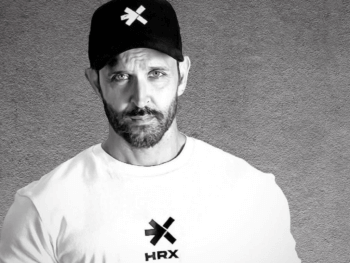
The self-help author and BurmanBooks CEO on the art of the deal and the business of changing lives.
A prolific author and speaker, as well as the CEO of a Toronto-based publishing house that distributes the wisdom of various in-demand self-help gurus, Sanjay Burman is a guy who’s literally made it his business to help others achieve their potential. But you don’t need to buy a book or attend a seminar to be convinced he’s got the goods; even a quick phone conversation gives the strong impression of a passionate yet grounded person, who’s not peddling quick fixes but hard-earned insights.
“I think it was a lot of trial and error,” he reflects. “I don’t think I am an exceptionally intelligent individual. I just think that I have this natural need to never accept ‘No.’ As you’re doing that, you fall down and you realize that’s not the route to go. You get back up, you start again, you go the second door, you realize that’s not the route to go. You just keep doing it until you end up with a door that opens.”
Indeed, before you can make a living guiding others down their paths, you have to uncover your own; and for Burman, the journey to enlightenment has been a storied one.
Most successful businesspeople display some kind of early aptitude for wheeling and dealing. Few have had quite so prodigious a start as Burman, who, in his senior year, spent three months selling his Scarborough high school to Pepsi.
Originally, the representative who dropped by the school had just been peddling Pepsi vending machines, but “by the time we finished,” says Burman, “I had negotiated for a Pizza Hut Express, I had negotiated for a computer lab, logos in the bathrooms . . . It turned out to be a $1.2 million deal.”
Alas, the world just wasn’t ready for Pepsi High yet, and the school not only rejected the arrangement but temporarily expelled the boy who put it together — because despite what he’d told the Pepsi rep, Burman didn’t have the authority to negotiate for new vending machines, let alone Pepsi-branded bathrooms, classrooms and textbooks.

Photo Credit: BurmanBooks
Burman would go on to channel his business savvy into a thriving career in the film world, where, in addition to becoming a vice-president at Characters Talent Agency, he produced David Cronenberg’s acclaimed 2002 drama Spider, which promptly attracted the attention of another Hollywood A-lister, Johnny Depp, who enlisted Burman to develop his next project.
But what started out as an opportunity to take his film career to the next level unexpectedly became the catalyst for its end, as a fateful exchange gave the young business savant something he’d been lacking: a bitter dose of self-awareness.
“I get an email from the director saying, ‘Look below,’” Burman recalls. I scroll down and it showed that my writer had gone around me and said, ‘Please don’t go through Sanjay, I don’t want to pay commission.’ I thought, ‘I just spent this time trying to nurture your career, trying to help you and give you an opportunity and this is what you do to me?’ I went to my father and said, ‘I’m feeling really down.’ He said, ‘That’s karma . . . You’re not a good person. You act in ways that are deceitful and you have to sleep with one eye open all the time. This is how it comes back to you.’ I closed my laptop and that was it. I was out.”

Photo Credit: BurmanBooks
The karmic shift was almost immediate, as the next day, Burman found himself on a park bench, “spilling his guts out” to a random stranger.
“She said, ‘I want you to come to my class.’ I said, ‘What is it?’ She said, ‘What do you care? You’re unemployed.’ So I went the next day, and it was a hypnotherapy class. They were showing open-heart surgery without anesthetic, memories being brought back from when you were two or three. And I just said, ‘That’s what I want to do. That is interesting.’"
Studying to become a master hypnotherapist and eventually even a body language expert (a.k.a. human lie detector), he made a new life treating people suffering from maladies like depression. But despite the shift in career and perspective, his entrepreneurial spirit remained as vital as ever.
Looking to help others “accelerate” their minds as he had, Burman conceived of a publisher specializing in “books to improve your relationships, achieve personal satisfaction, increase your income and change your life.” Thus, in 2004, BurmanBooks was born — and swiftly wound up on the brink of death.

Photo Credit: BurmanBooks
“The first season was a complete disaster — it was the wrong trim size, it was the wrong covers, it was the wrong pricing. I mean, it was wrong all the way down the road,” he reflects. Luckily his ails were easily cured by a trip to the dentist.
“So I’m getting dental surgery, costing about $5,000. I was doing the math in my head; $5,000 x [probably around] 5,000 patients? That’s a lot of money. So I convinced the surgeon to invest in me. I left with $300,000.”
Of course, we’d be remiss not to find out exactly how a man can sit down in a dentist’s chair in financial turmoil and talk his way into three hundred grand.
“The understanding that people don’t like to say ‘No’ is the thing you have to start off with,” Burman offers. “. . . and then on top of that, when you’re trying to sell somebody on yourself — because that’s essentially what you’re doing, people buy into you — you have to stop thinking about it from the perspective of what you get for it; you have to start to think about it from the perspective of what they get. Walk in their shoes first and understand what is stopping them from writing a cheque to you.”
Also, a little help from Oprah never hurts.
“I happened to be in a situation where I got this bootlegged copy of [2006 self-help documentary] The Secret, and I’m watching it — no one had ever heard of it — and I looked at these people [featured in the film] and I said, ‘We need to sign them.’ So I spent two months trying to sign them, finally did sign most of them, and then like three weeks later, they went on Oprah, so we kind of blew up into 12 countries right away.”
Though he still sees patients on the weekends, Burman’s days are now largely spent closing book deals with the wildly successful likes of Wind Mobile founder Anthony Lacavera, as well as dipping his toe back in the film world with an adaptation of Burman author Larry Garrett’s Hypnotizing the Devil: The True Story of a Hypnotist Who Treated Saddam Hussein’s Psychotic Son.
It’s been a long trek across a frequently bumpy road, but it appears as though the kid who tried to sell his high school to Pepsi has finally struck the right deal. But even though he may have been gifted with a rare mind for business, Burman believes his key to success is the same as anyone else’s.
“Follow your instinct. And your instinct is your first [impulse] that you feel, not your second, which is your brain. And when you’re following your instinct, you have to be persistent. That’s the key to winning at anything. If at first you don’t succeed, you’re running about average.”
Main Image Photo Credit: www.cbc.ca
Matthew Currie
Author
A long-standing entertainment journalist, Currie is a graduate of the Professional Writing program at Toronto’s York University. He has spent the past number of years working as a freelancer for ANOKHI and for diverse publications such as Sharp, TV Week, CAA’s Westworld and BC Business. Currie ...














































































































